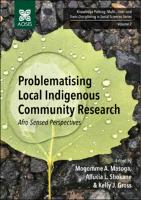Problematising Local Indigenous Community Research
Afro-Sensed Perspectives
| dc.contributor.author | Karel, Keleco J.N. | |
| dc.contributor.author | Mammino, Liliana | |
| dc.contributor.author | Ocholla, Dennis N. | |
| dc.contributor.author | Themane, Mahlapahlapana | |
| dc.contributor.author | Shava, Soul | |
| dc.contributor.author | Mapaura, Anthony | |
| dc.contributor.author | Zazu, Cryton | |
| dc.contributor.author | Blitz, Lisa V. | |
| dc.contributor.author | Shokane, Allucia L. | |
| dc.contributor.author | Masoga, Mogomme A. | |
| dc.contributor.author | Kufeyani, Phoebe | |
| dc.contributor.author | Gross, Kelly J. | |
| dc.contributor.author | Welch-Scott, Crystal | |
| dc.contributor.author | Tondi, Pakiso | |
| dc.contributor.author | Sithole, Sello L. | |
| dc.contributor.author | Ezeuduji, Ikechukwu O. | |
| dc.contributor.author | Togo, Chamunorwa A. | |
| dc.contributor.author | Mathebane, Mbazima S. | |
| dc.contributor.author | Mathipa, Elias R. | |
| dc.contributor.author | Ndlovu, Morgan | |
| dc.contributor.author | Nzama, Antonia A. | |
| dc.contributor.editor | Masoga, Mogomme A. | |
| dc.contributor.editor | Shokane, Allucia L. | |
| dc.contributor.editor | Gross, Kelly J. | |
| dc.date.accessioned | 2022-04-08T09:44:18Z | |
| dc.date.available | 2022-04-08T09:44:18Z | |
| dc.date.issued | 2021 | |
| dc.identifier | ONIX_20220408_9781776341665_5 | |
| dc.identifier | ONIX_20220408_9781776341665_5 | |
| dc.identifier | OCN: 1322180691 | |
| dc.identifier.issn | 2618-0812 | |
| dc.identifier.uri | https://library.oapen.org/handle/20.500.12657/53898 | |
| dc.description.abstract | This book deliberates on developments related to Knowledge Pathing: Multi-, Inter- and Trans-Disciplining in Social Sciences. The book explores the value of this vexed concept in advancing the course for multi-, inter- and trans-disciplinary perspectives, methodologies, theories and epistemologies of knowledge pathing. The discourse on knowledge pathing remains critical in advancing debates and dialogues in the humanities and social sciences spaces of research and studies. This book makes a significant contribution to the scholarly understanding of indigenous knowledge research by focusing on problematising local indigenous community research from Afro-sensed perspectives. The field of indigenous knowledge research and higher education in Africa is complex. Yet, across the continent, higher education has been the sector to least embrace Indigenous Knowledge Systems (IKS) or regard indigenous science as a legitimate source of inspiration for the development of youth and local communities. Higher education institutions and local indigenous communities should thus generate knowledge and power through research. On the other hand, higher education researchers should use their research processes and skills for cross-beneficiation when engaging local indigenous communities. This book embodies the current discourse on decolonisation and the use of indigenous knowledge in research and is intended for research specialists in the field of indigenous knowledge systems. | |
| dc.language | English | |
| dc.relation.ispartofseries | Knowledge Pathing: Multi-, Inter- and Trans-Disciplining in Social Sciences Series | |
| dc.subject.classification | thema EDItEUR::J Society and Social Sciences::JK Social services and welfare, criminology | en_US |
| dc.subject.other | Humanities | |
| dc.subject.other | social sciences | |
| dc.subject.other | research | |
| dc.subject.other | indigenous knowledge | |
| dc.subject.other | knowledge pathing | |
| dc.subject.other | afro-sensed perspective | |
| dc.title | Problematising Local Indigenous Community Research | |
| dc.title.alternative | Afro-Sensed Perspectives | |
| dc.type | book | |
| oapen.identifier.doi | 10.4102/aosis.2021.BK233 | |
| oapen.relation.isPublishedBy | d7387d49-5f5c-4cd8-8640-ed0a752627b7 | |
| oapen.relation.isbn | 9781776341665 | |
| oapen.relation.isbn | 9781776341641 | |
| oapen.relation.isbn | 9781776341658 | |
| oapen.series.number | 2 | |
| oapen.pages | 392 | |
| oapen.place.publication | Durbanville | |
| oapen.remark.public | University of Zululand |

